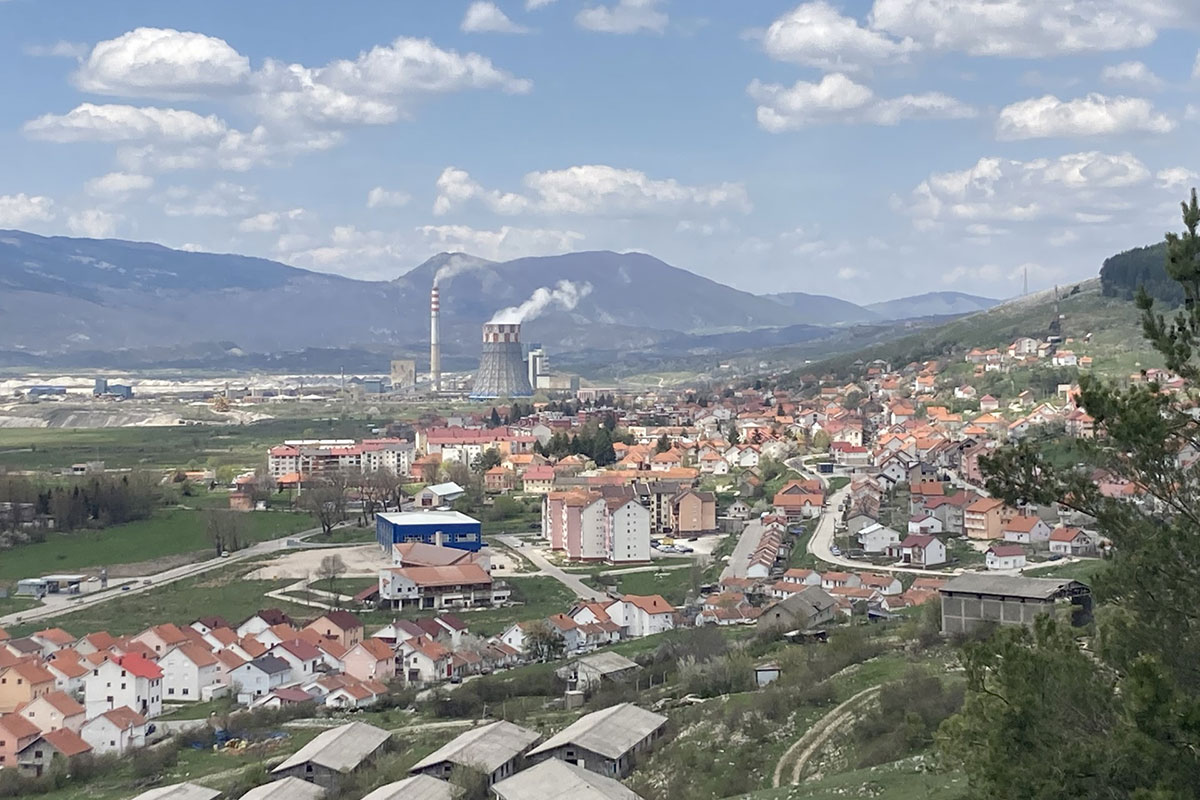For residents of large cities in the region, the quality of life is declining. Reduction of green areas, illegal construction, overcrowding, and traffic congestion are part of everyday life. However, the situation is not better in many smaller towns either: poor infrastructure, unreliable water and electricity supply, and lack of sewage systems, are just some of the problems. In the eastern part of Herzegovina, which is still more rural than urban, environmental pollution is a big problem.
Trebinje, on the other hand, is faced with the intensified construction of residential and commercial buildings, in which the public interest gives way to the interest of investors, so the City Assembly has changed the planning documents in order to meet their interests, as explained in the proposed decision.
The residents of Gacko find themselves in the most difficult position because they live next to a thermal power plant that emits tons of ash into the air every day. From the approximately 100-meter-tall chimney, ash covers an area with a diameter of more than 20 kilometers, and thanks to the winds it reaches further than it appears at first glance. The porous, karst terrain contributes to the pollution reaching the subterranean rivers, so, according to some investigations, traces are also found in the watercourses in the hinterland of Dubrovnik.
People earn their living at the price of their own health
In the past, Gacko, a small town situated 940 meters above sea level, with about five thousand inhabitants, was considered an air spa. Bronchitis and asthma did not exist there. Surrounded by the mountains Lebršnik and Volujak, alongside, according to many, the most beautiful national park Sutjeska, it was an oasis and a kind of nature reserve. And then, in the mid-1980s, a thermal power plant was built, an open-pit mine was formed for the exploitation of coal, and everything went wrong for nature and health.
With such a significant resource that was often called a steam factory, Gacko still failed to develop or even increase its population.
Although it officially belongs to the list of developed municipalities in Republika Srpska because practically the only criterion is income per capita, in essence, it is a poorly developed area. There is no sewage system, waste water is not treated, summers are characterized by water restrictions, and the place does not have an organized promenade, nor a park and playground for children. Not to mention a swimming pool, trim trails and bike paths, sports halls, and ice rinks.
The biggest problem is the enormous pollution of nature as a result of the operation of the Gacko Mine and thermal power plant. And, while tens of hectares of fertile land are dug up in search of coal, then filled with tailings, and waterways are polluted with wastewater that comes out untreated from the plant and mine pits, two thousand tonnes of ash are also released from the chimneys into the air every day for the last months, years even! And this is happening in plain sight, not only to citizens but also to competent institutions, environmental inspections, and prosecutor's offices. But in BiH, as in some other countries in the region, institutions have lost their purpose, and decisions are made in accordance with personal assessments, agreements, and/or interests of officials.
Likewise, the mentioned company Mine and Thermal Power Plant (RiTE) Gacko, which operates as part of Elektroprivreda Republika Srpska (RS), operates contrary to regulations and laws. In addition to not meeting the provisions of the environmental permit, it violates at least several other laws - the one on the protection of the environment and the health of the population, for example.
Nevertheless, officials - from municipal to entity level - have the same attitude - RiTE Gacko must work and produce electricity at any cost.
And they pay the price with their health. A large number of children have problems with bronchitis and allergies, and adults are not spared either. Conjunctivitis, difficulty breathing, itching are symptoms of an increasing number of residents who seek help at the pharmacy, rather than at the local health center because they have to buy most of the medicines anyway. And because of the unpaid contribution for medical insurance, for a while, most of the workers in the municipality were without insurance.
 Source: Wikimedia Commons
Source: Wikimedia Commons
"Compared to other places in our region, the number of people suffering from cancer and allergic diseases has increased significantly here, and lung and breast cancer and allergies to an unknown substance are frequently observed", said Dr. Zlatan Ivković, then a councilor in the Assembly of the Gacko municipality.
They pay substantive amounts of money for medicines since most of them are not on the list of the Health Insurance Fund. However, there are no concrete data because, for the past four decades that the Gacko TPP has been operating, there has been no systematic monitoring of the health status of the population, nor a study of the impact of this plant on the health of the population. At the 2019 session, the Gacko Municipal Assembly dealt with pollution and decided to conduct a study, but nothing has been done about it to date.
From February to May 2017, the Centre for Environment from Banja Luka conducted an online survey intended for the residents of Gacko, the aim of which was to obtain opinions on the operation of the existing thermal power plant Gacko, with a special focus on air quality. The survey results are not at all encouraging.
“The answers of the citizens show that the situation in Gacko is more than worrying, while at the same time the health of the population is not on the list of priorities. The measuring station in the city centre is not functioning, and data on air quality and particle emissions can only be obtained from the thermal power plant. Unfortunately, it can be seen that there is no will of the authorities to provide citizens with data transparency and thereby discover where the pollution is coming from," Duška Kudra, from the Center for Environment, stated.
That information alone speaks volumes about what the authorities prioritize and how much they care for the health of the residents of this region.
Due to the ash covering the wider area, it is difficult to talk about healthy food, which was a brand and even an asset of the local community in the promotion of mountain tourism. Livestock also graze on grass and ash, and the fact that veterinarians note an increase in the number of miscarriages in cows shows how this affects them.
"There were a number of cases in the villages of Nadanići, Kravarevo and Rudo Polje. The cows were grazing, there is no other reason for that, and the damage is great," said one of the locals at a protest in front of RiTE Gacko in mid-May this year.
"What is happening is terrible. For whom do we give birth to children? They say we eat healthy because we live in the countryside, yet how can the food be healthy when our cattle come from grazing and the cream and milk are all contaminated. Our air is polluted, is there an end to this?” asked Snežana Marković, a resident of Nadanić.
We will have to wait for the solution
The reason for the excessive emission of ash into the air lies in the low-quality coal used to generate electricity at the Gacko Thermal Power Plant. Namely, the coal is exploited from the so-called Povlatna zone - an area where coal is located at a shallow depth, so its exploitation is cheaper and simpler. Such coal is generally of lower calorific value and with a high percentage of impurities. This means that when burned in the boiler of the thermal power plant, it produces less power, it is harder to burn and the share of ash is up to 30%. The fuel of somewhat superior quality, coming from the "main coal seam", was lost some time ago primarily due to bad management decisions, delayed stripping, and major machinery malfunctions.
Now the management of the company claims that they have a solution, but it will take at least two years. Namely, the plan is to acquire a coal separation plant that will raise the quality of the coal. This costs money (about 35 million euros, said the Prime Minister of RS, Radovan Višković), which RiTE Gacko does not have, but expects help from Elektroprivreda RS and the Government of RS.
On the other hand, the open-pit mine occupies a significant part of the Field of Gacko - the most fertile land, the area that most resemble a huge wound - it is neither reduced nor recultivated, and thousands of tonnes of fertile soil that should have been preserved, were irretrievably lost in the landfill along with tailings.
The opportunity to use this resource for the benefit of the municipality was missed. At the end of its technological life-span, TE Gacko has destroyed nature so much that it will take not only time, but also huge resources to recultivate the area as much as possible. Bad solutions and raising the level of the embankment caused enormous damage, the repair of which was left to future generations.
Yet, everything could have been different.
For a small community, such a massive resource could really bring prosperity and a good standard of living for each resident. The fact that the opportunity was not taken to install heating under the main roads and sidewalks in this place of frequent snowfall is perhaps too futuristic (although it shouldn't be), but the fact that the enormous heat goes into the air instead of being used for heating the houses and apartments in Gacko, is a true indicator of the real negligence of all those who at some point were in leadership positions.
Perhaps they had the power, but they lacked vision and desire to work for the common good. That's why the price is now paid by those who stayed to live on the edge of the mine, perhaps regretting some missed opportunities to live in another, more pleasant and healthier place.
For now, the residents of Gacko have a promise from the Prime Minister of the RS, Radovan Višković, that the government will help the RiTE Gacko company to buy a coal purification plant in the next two years, which, they claim, would reduce particle emissions and make electricity production more profitable. Until then, they appeal to the residents of this municipality to be patient and stoically tolerate the ashes for at least a few more years.
The blog was created as part of the “Tales from the Region” initiative led by Res Publica and Institute of Communication Studies, in cooperation with partners from Montenegro (PCNEN), Kosovo (Sbunker), Serbia (Autonomija), Bosnia and Herzegovina (Analiziraj.ba), and Albania (Exit), within the project "Use of facts-based journalism to raise awareness of and counteract disinformation in the North Macedonia media space (Use Facts)" with the support of the British Embassy in Skopje.This edition of Tales from the Region is also done in partnership between ICS and the UPSURGE project, funded within the European Union’s Horizon 2020 under grant agreement No. 101003818.
Please refer to the Terms before commenting and republishing the content. Note: The views and opinions expressed in this article are those of the author and do not necessarily reflect the views of the Institute of Communication Studies or the donor.


